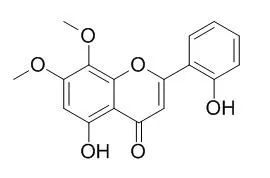METHODS AND RESULTS:
The aim of the current study is to probe the anti-inflammatory/anti-allergic potential of seven phytoconstituents (andrographolide, neoandrographolide, isoandrographolide, andrograpanin, 14-deoxy-11,12-didehydroandrographolide, 7-O-methylwogonin and Skullcapflavone I) isolated from Andrographis paniculata (King of bitters) on the production of key inflammatory/allergic mediators (NO, PGE(2), IL-1 beta, IL-6, LTB(4), TXB(2) and histamine).
The results demonstrated that andrographolide, isoandrographolide, 7-O-methylwogonin and Skullcapflavone I significantly inhibited LPS stimulated NO and PGE(2) release in J774A.1 macrophages. Andrographolide, isoandrographolide and 7-O-methylwogonin showed considerable inhibition of IL-1 beta production in LPS elicited macrophages. LPS induced IL-6 production was significantly inhibited by andrographolide, isoandrographolide and Skullcapflavone I in a concentration dependent manner. The results revealed that andrographolide, isoandrographolide and Skullcapflavone I significantly decreased TXB(2) release in A23187 activated HL-60 promyelocytic cells. Furthermore, the anti-allergic properties of the phytoconstituents was investigated on A23187 induced LTB(4) production (HL-60 cells) and histamine release (RBL-2H3 basophilic cells). The results showed that only Skullcapflavone I and 7-O-methylwogonin showed marked inhibitory effect on LTB(4) production, however, only 7-O-methylwogonin exerted dose-dependent inhibition towards histamine release.
CONCLUSIONS:
Therefore, this study indicates that some of these phytoconstituents exhibit potent anti-inflammatory/anti-allergic effects by modulating different inflammatory/allergic mediators. Hence, these phytoconstituents might provide useful phytomedical treatment against variety of inflammatory and allergic disorders. |






 Cell. 2018 Jan 11;172(1-2):249-261.e12. doi: 10.1016/j.cell.2017.12.019.IF=36.216(2019)
Cell. 2018 Jan 11;172(1-2):249-261.e12. doi: 10.1016/j.cell.2017.12.019.IF=36.216(2019) Cell Metab. 2020 Mar 3;31(3):534-548.e5. doi: 10.1016/j.cmet.2020.01.002.IF=22.415(2019)
Cell Metab. 2020 Mar 3;31(3):534-548.e5. doi: 10.1016/j.cmet.2020.01.002.IF=22.415(2019) Mol Cell. 2017 Nov 16;68(4):673-685.e6. doi: 10.1016/j.molcel.2017.10.022.IF=14.548(2019)
Mol Cell. 2017 Nov 16;68(4):673-685.e6. doi: 10.1016/j.molcel.2017.10.022.IF=14.548(2019)